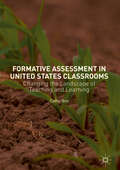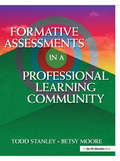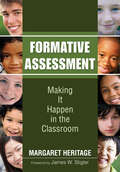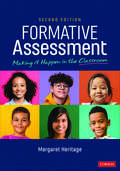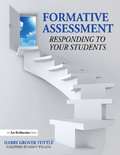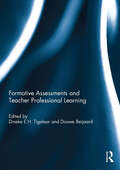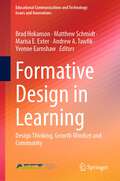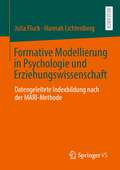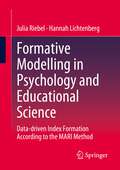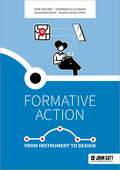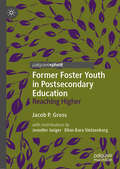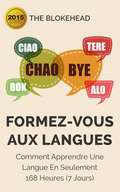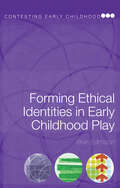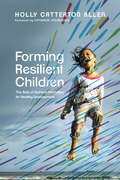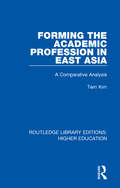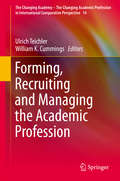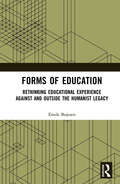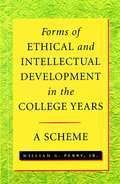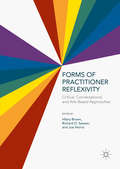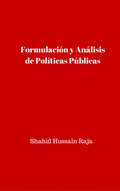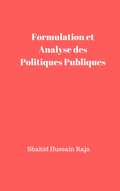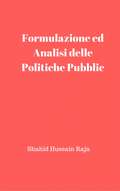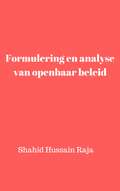- Table View
- List View
Formative Assessment in United States Classrooms: Changing the Landscape of Teaching and Learning
by Cathy BoxThis book examines the history of formative assessment in the US and explores its potential for changing the landscape of teaching and learning to meet the needs of twenty-first century learners. The author uses case studies to illuminate the complexity of teaching and the externally imposed and internally constructed contextual elements that affect assessment decision-making. In this book, Box argues effectively for a renewed vision for teacher professional development that centers around the needs of students in a knowledge economy. Finally, Box offers an overview of systemic changes that are needed in order for progressive teaching and relevant learning to take place.
Formative Assessment in a Professional Learning Community
by Todd Stanley Betsy MooreThe ideas and examples in this book help teachers successfully collaborate to raise student achievement through the use of formative assessments. Here, Todd Stanley and Betsy Moore, educators with over 40 years of combined experience, offer proven formative assessment strategies to teachers in a professional learning community.
Formative Assessment: Making It Happen in the Classroom
by Margaret HeritageA practical, in-depth guide to implementing formative assessment in your classroom! Formative assessment allows teachers to identify and close gaps in student understanding and move learning forward. This research-based book walks readers through every step of the process and offers illustrative examples across a range of subject areas and grade levels. This book explains how to: <p><p> Clearly articulate learning progressions, learning goals, and success criteria <p> Select strategies for assessment and provide quality feedback <p> Engage students in self-assessment and self-management <p> Create a classroom environment that values feedback as part of the learning process
Formative Assessment: Making It Happen in the Classroom
by Margaret HeritageDevelop the knowledge and skills needed for successful formative assessment Formative assessment is a process used by teachers and students to keep learning moving forward. In the 10 years since the first edition of Formative Assessment was published, the practice has become a mainstay in classrooms, but that does not mean that it is easy. Education expert Margaret Heritage walks readers through every step of implementation and offers numerous examples that illustrate formative assessment practices across a range of subjects and grade levels. She explains how to articulate learning progressions, goals, and success criteria; select assessment strategies and provide quality feedback; engage students in self-assessment and self-management; and create an environment that values feedback as part of the learning process. Based on the latest research, this second edition addresses: College and career readiness standards, Common Core State Standards, and Next Generation Science Standards Equity and individual learning needs Discipline-based and student-centered formative assessment Social and emotional learning Written for teachers and those who support them, this book will help all educators develop the skills necessary to get students on the path to success.
Formative Assessment: Making It Happen in the Classroom
by Margaret HeritageDevelop the knowledge and skills needed for successful formative assessment Formative assessment is a process used by teachers and students to keep learning moving forward. In the 10 years since the first edition of Formative Assessment was published, the practice has become a mainstay in classrooms, but that does not mean that it is easy. Education expert Margaret Heritage walks readers through every step of implementation and offers numerous examples that illustrate formative assessment practices across a range of subjects and grade levels. She explains how to articulate learning progressions, goals, and success criteria; select assessment strategies and provide quality feedback; engage students in self-assessment and self-management; and create an environment that values feedback as part of the learning process. Based on the latest research, this second edition addresses: College and career readiness standards, Common Core State Standards, and Next Generation Science Standards Equity and individual learning needs Discipline-based and student-centered formative assessment Social and emotional learning Written for teachers and those who support them, this book will help all educators develop the skills necessary to get students on the path to success.
Formative Assessment: Responding to Your Students
by Harry Grover TuttleThis "how-to" book on formative assessment is filled with practical suggestions for teachers who want to use formative assessment in their classrooms. With practical strategies, tools, and examples for teachers of all subjects and grade levels, this book shows you how to use formative assessment to promote successful student learning.
Formative Assessments and Teacher Professional Learning
by Dineke E.H. Tigelaar and Douwe BeijaardHow can formative assessment be used as a means to support teacher professional learning? This book presents several studies, from different countries, on approaches to formative assessment of teachers, both before they start working, and during their careers. These approaches draw on insights from studies into effective teacher professional development. Together, the chapters in this book provide an overview of the various ways in which formative assessment may be used to support teacher professional learning, and shed light on choices that can be made in designing such assessments. The studies illustrate how teachers may perceive formative assessment methods, how their learning processes might unfold during formative assessment processes, and which struggles they may have to deal with during the process. The book furthermore addresses questions concerning the impact of formative assessments on teacher learning. As such, this volume provides theoretical as well as practical prospects, as well as challenging ideas for how formative assessment may move further towards being an effective means for supporting teacher learning. This book was originally published as a special issue of Teachers and Teaching: Theory and Practice.
Formative Design in Learning: Design Thinking, Growth Mindset and Community (Educational Communications and Technology: Issues and Innovations)
by Brad Hokanson Andrew A. Tawfik Matthew Schmidt Marisa E. Exter Yvonne EarnshawLearning design is an ill-structured process that must account for multiple stakeholders, contextual constraints, and other instructional needs. Whereas many theories outline learning theories, less is known about the formative design process and how it impacts the design and development of learning technologies. This is critical because a formative view considers the issues that educators encounter and how to overcome them during the learning design process.This edited volume provides a multi-faceted look at theories, studies, and design cases that employ formative design in learning across multiple domains. Topics include processes oriented around design thinking, design-based research, and others. Additional chapters provide contextual considerations, such as describing how formative design was used to design learning solutions for STEM learning and food banks, as well as overcoming challenges in emergency remote teaching. In doing so, the book provides an interdisciplinary view that explores how scholars and practitioners engage in formative practices that support a wide array of learners and contexts.
Formative Modellierung in Psychologie und Erziehungswissenschaft: Datengeleitete Indexbildung nach der MARI-Methode
by Julia Fluck Hannah LichtenbergFormative Messmodelle sind in der Psychologie und Erziehungswissenschaft weitgehend unbekannt, wohingegen sie in den Wirtschaftswissenschaften zum Standardrepertoire gehören. In diesem Buch wird das formative Messmodell dargestellt und vom reflektiven Modell abgegrenzt. Möglichkeiten der Anwendung in Psychologie und Erziehungwissenschaften werden dargestellt und kritisch diskutiert. Mit der MARI-Methode wird eine Vorgehensweise präsentiert, anhand derer Anwenderinnen und Anwender formative Modelle umsetzen können.
Formative Modelling in Psychology and Educational Science: Data-driven Index Formation According to the MARI Method
by Hannah Lichtenberg Julia RiebelFormative measurement models are largely unknown in psychology and education, whereas they are part of the standard repertoire in economics. This book presents the formative measurement model and distinguishes it from the reflective model. Possibilities of application in psychology and education are presented and critically discussed. With the MARI method, a procedure is presented that enables users to implement formative models.
Formative action: From instrument to design
by René Kneyber Dominique Sluijsmans Valentina Devid Blanca Wilde LópezFormative practices can motivate students, enhance their self-regulation, and help find a better balance between education and assessment. However, the successful implementation of formative practices and feedback in lessons begins with a well thought out educational design. In this book, the authors outline the implementation principles to which formative action must adhere to be of practical and substantive significance. They also explain how educators can use feedback more effectively and efficiently, and the essential role of instilling a shared sense of quality. This book is for teachers, educators, leaders, and curriculum developers from primary to higher education who want to successfully integrate formative practices into their daily teaching methods.
Formative action: From instrument to design
by René Kneyber Dominique Sluijsmans Valentina Devid Blanca Wilde LópezFormative practices can motivate students, enhance their self-regulation, and help find a better balance between education and assessment. However, the successful implementation of formative practices and feedback in lessons begins with a well thought out educational design. In this book, the authors outline the implementation principles to which formative action must adhere to be of practical and substantive significance. They also explain how educators can use feedback more effectively and efficiently, and the essential role of instilling a shared sense of quality. This book is for teachers, educators, leaders, and curriculum developers from primary to higher education who want to successfully integrate formative practices into their daily teaching methods.
Former Foster Youth in Postsecondary Education: Reaching Higher
by Jacob P. GrossThis book examines the attainment gap between foster youth and their peers. Specifically focusing on post-secondary access and success for foster youth, Gross points out the challenges foster youth face in the primary and secondary school context, such as being less likely to complete high school. These barriers to former foster youth continue once enrolled in post-secondary education, and can manifest as lack of institutional support, financial barriers, and limited to no familial support. The author discusses what policy makers and practitioners need to know to better support the educational attainment of former foster youth.
Formez-vous aux langues (7 jours): Comment apprendre une langue en seulement 168 heures (7 jours)
by The BlokeheadApprendre une langue étrangère est aussi fascinant qu'exigeant. L'apprentissage des langues se distingue des autres disciplines, comme les mathématiques, la géographie ou la composition de poèmes. Il ne s'agit pas simplement de s'asseoir et de mémoriser des centaines de pages et de formules, pour pouvoir se lever et commencer à parler la langue couramment et avec confiance. Cela prend du temps, demande de la patience, de la souplesse, de la créativité et beaucoup de travail. Au cours des 7 prochains jours, ce livre vous guidera à travers un processus très spécial et efficace pour apprendre n'importe quelle langue.
Forming Ethical Identities in Early Childhood Play (Contesting Early Childhood)
by Brian EdmistonThrough compelling examples, Brian Edmiston presents the case for why and how adults should play with young children to create with them a 'workshop for life'. In a chapter on 'mythic play' Edmiston confronts adult discomfort over children's play with pretend weapons, as he encourages adults both to support children's desires to experience in imagination the limits of life and death, and to travel with children on their transformational journeys into unknown territory. This book provides researchers and students with a sound theoretical framework for re-conceptualising significant aspects of pretend play in early childhood. Its many practical illustrations make this a compelling and provocative read for any student taking courses in Early Childhood Studies.
Forming Resilient Children: The Role of Spiritual Formation for Healthy Development
by Holly Catterton AllenMany children today are growing up in the midst of adversity, whether brought on by family difficulties or larger societal crises. All children need to be able to deal with stress, cope with challenges, and persevere through disappointments. While we cannot protect children from all hardships, we can promote healthy development that fosters resilience. In this interdisciplinary work, Holly Catterton Allen builds a bridge between resilience studies and children's spiritual formation. Because children are spiritual beings, those who work with them can cultivate spiritual practices that are essential to their thriving in challenging times. This book equips educators, counselors, children's ministers, and parents with ways of developing children's spirituality to foster the resilience needed to face the ordinary hardships of childhood and to persevere when facing trauma. It offers particular insight into the spiritual experiences of children who have been hurt by life through chronic illness, disability, abuse, or disasters, with resources for healing and hope.
Forming the Academic Profession in East Asia: A Comparative Analysis (Routledge Library Editions: Higher Education #14)
by Terri KimOriginally published in 2001, Forming the Academic Profession in East Asia, examines the changing shape of the academic profession in South Korea, Malaysia and Singapore since the colonial period, and as a reflection of both the inherited models of higher education and their redefinition after the colonial period. The analysis takes into account the connections and disconnections between the colonial and postcolonial periods in shaping the academic profession.
Forming, Recruiting and Managing the Academic Profession
by William K. Cummings Ulrich TeichlerThis book focuses on the changes in academic careers and their implications for job attachment and the management of academic work. Against the background of an ageing profession, with different demands on academic staff, increasing insecurity, accountability and internationalisation, it discusses important, common themes in detail. This book examines such aspects as the nature of academic careers and recent changes in careers, changing biographies, rewards of academic work such as income and job satisfaction, internationalisation of the academy, and the organisation and management of academic work sites. This book is the second of two books highlighting findings from research on the academic profession, notably, the Changing Academic Profession Study and the European project supported by the European Science Foundation on changes in the academic profession in Europe (EUROAC). An adapted version of the CAP questionnaire has been used to carry out the survey in those countries that had not been involved before in the CAP survey. Altogether 19 countries are covered by the CAP project and an additional seven European countries are covered by EUROAC.
Forms of Education: Rethinking Educational Experience Against and Outside the Humanist Legacy
by Emile BojesenForms of Education analyses the basic tenets of the humanist legacy in terms of its educational ethos, examining its contradictions and its limits, as well as the extent of its capture of educational thought. It develops a broader conception of educational experience, which challenges and exceeds those limits. This book deflates the compulsion to educate. It delegitimises the imposition of any particular practice in education. It defines education, openly and non-restrictively, as the (de)formation of non-stable subjects, arguing that education does not require specific formations, nor the formation of specific forms, only that form does not cease being formed in the experience of the non-stable subject. Exploding and pluralising what amounts to ‘education’, this book rethinks what might still be called educational experience against and outside the ethos of the humanist legacy that confines its meaning. This book will be of interest to scholars and postgraduate students in the fields of philosophy of education, educational theory, history of education and sociology of education.
Forms of Ethical and Intellectual Development in the College Years: A Scheme
by William G. PerrySince its original publication in 1970, this landmark book by William Perry has remained the cornerstone of much of the student development research that followed. Using research conducted with Harvard undergraduates over a fifteen-year period, Perry derived an enduring framework for characterizing student development--a scheme so accurate that it still informs and advances investigations into student development across genders and cultures. Drawing from firsthand accounts, Perry traces a path from students' adolescence into adulthood. His nine-stage model describes the steps that move students from a simplistic, categorical view of knowledge to a more complex, contextual view of the world and of themselves. Throughout this journey of cognitive development, Perry reveals that the most significant changes occur in forms in which people perceive their world rather than in the particulars of their attitudes and concerns. He shows ultimately that the nature of intellectual development is such that we should pay as much attention to the processes we use as to the content. In a new introduction to this classic work, Lee Knefelkamp--a close colleague of Perry's and a leading expert on college student development--evaluates the book's place in the literature of higher education. Knefelkamp explains how the Perry scheme has shaped current thinking about student development and discusses the most significant research that has since evolved from Perry's groundbreaking effort. Forms of Ethical and Intellectual Development in the College Years is a work that every current and future student services professional must have in their library.
Forms of Practitioner Reflexivity
by Hilary Brown Joe Norris Richard D. SawyerThis edited volume addresses the different methods professionals use to promote a critical reflective and reflexive stance among practitioners, leading to both a reconceptualization of practice and its subsequent change. The goal of increased reflection in professional education is intended to expand approaches for professionals to work with diverse others. It is also intended to increase their levels of cognitive differentiation and depth of professional consciousness about themselves alongside diverse others in a rapidly changing world. This is an important issue in a range of applied professional programs, from education to medicine, social work to psychology, business to criminal justice, in nearly every country in the world.
Formulación y Análisis de Políticas Públicas
by Shahid Hussain Raja José Pedro Galindo MacíasDurante los últimos años, los estudios de políticas públicas han estado recibiendo mucha atención en los círculos académicos de todo el mundo por diversas razones. Además de la creciente conciencia sobre el papel y la importancia de la formulación y la implementación de políticas públicas en la lucha contra los desafíos multifacéticos que enfrenta cada país, la razón principal de este interés en cuestiones de política pública ha sido el papel cada vez más firme de las organizaciones de la sociedad civil y los medios masivos de información. Desean saber la forma en que se formulan las políticas públicas que afectan a un hombre común y la forma en que funciona el aparato de gobierno, con el fin de que puedan tomar decisiones informadas y las acciones apropiadas. La formulación de políticas públicas ha ido un cambio metamórfico durante las últimas tres o cuatro décadas, debido al rápido proceso de globalización del mundo. Existen por lo menos cuatro formas en que la globalización está afectando la formulación de políticas en cada país. En primer lugar, gracias a los medios sociales y electrónicos, los pequeños problemas que hace aproximadamente una década sólo podían encontrar lugar en la última página de un periódico nacional, se vuelven noticias de última hora en los principales canales mundiales, creando movimientos de apoyo y solidaridad en diferentes partes del mundo. En segundo lugar, con el mundo que se globaliza rápidamente, los problemas mundiales tales como la degradación ambiental, el cambio climático, los alimentos modificados genéticamente, etc., que sólo se abordan en los pasillos del poder, se están debatiendo en los salones de los países y se están creando fuertes movimientos de apoyo entre la población. En tercer lugar, los centros de poder real y de toma de decisiones están cambiando de un nivel local a un nivel global, teniendo el alcance de los grupos de interés internos con su
Formulation et Analyse des Politiques Publiques
by Shahid Hussain RajaQu’est-ce qu’une politique publique, pourquoi et comment sont-elles formulées et quelles sont les caractéristiques d’une bonne politique publique? Cet ouvrage définit ce qu’est une politique publique et en décrit les différentes caractéristiques. Il énumère les étapes et les procédures adoptées en matière de formulation d’une politique publique dans un pays. Il explique ensuite les caractéristiques d’une bonne politique publique et s’achève par l’examen du processus des politiques publiques dans un pays en voie de développement comme le Pakistan.
Formulazione ed Analisi delle Politiche Pubbliche
by Shahid Hussain Raja Loris PalmitestaDefinisce cos'è un Politica Pubblica nelle sue varie caratteristiche. Definisce i passaggi necessari e le procedure adottate nella formulazione di una politica pubblica in una nazione. In seguito spiega le caratteristiche di una buona politica pubblica termine con un esame del processo delle politiche pubbliche in un paese in via di sviluppo come il Pakistan.
Formulering en analyse van openbaar beleid
by Shahid Hussain RajaGedurende de afgelopen jaren heeft openbaar beleid over de hele wereld om diverse redenen veel aandacht in de academische kringen gekregen. Naast het tonemende bewustzijn over de rol en het aanpakken van de veelzijdige uitdagingen waarmee elk land geconfronteerd wordt, is de belangrikste reden voor deze interesse in openbare beleidskwesties de steeds assertievere rol van de maatschappelijke organisaties en de media. Ze willen weten hoe openbaar beleid dat een gewone man raakt, geformuleerd wordt en de manier waarop het bestuursapparaat werkt, zodat ze ingelichte oordelen kunnen maken en ingelichte maatregelen kunnen nemen. De formulering van het openbaar beleid heeft de afgelopen drie of vier decennia een metamorfe verandering onderggan als gevolg van de snel globaliserende wereld. Er zijn minstens vier manieren waarop globalisering de beleidsformulering in elk land beïnvloedt. Ten eerste, dankzij sociale en elektronische media, worden kleine problemen die een decennium of zo geleden alleen op de achterpagina van een nationale krant geplaatst konden worden, breaking news op de belangrijkste wereldwijde kanalen, waardoor belangbehartiging en sympathie bewegingen in verschillende delen van de wereld ontstonden. Ten tweede, met de snel globaliserende wereld, worden mondiale kwesties zoals aantasting van het milieu, klimaatverandering, GMO, enz., die alleen in de wandelgangen van de macht besproken worden, in de salons van landen besproken en sterke belangbehartigingingsbewegingen onder de bevolking scheppen. Ten derde, verschuiven de centra van feitelijke macht en besluitvorming van lokaal naar mondiaal niveau met het bereik van binnenlandse belangengroepen naar hun sympathisanten in internationale organisaties, multinationals en die in de regeringen van mondiale mogendheden. Deze outreach stelt hen in staat hun eigen regering te dwingen om aan hun eisen te voldoen vanwege de economishe en politieke invload van de mondiale spelers.
